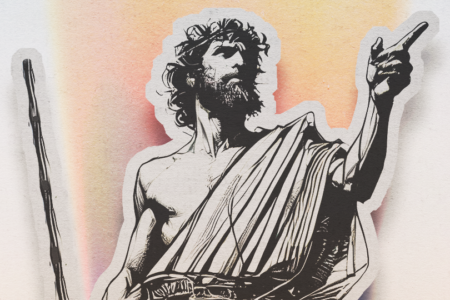Jesus & John
A look at John the Baptist’s relationship to the Messiah of Israel
John the Baptist is one of the strangest, most unusual, and most interesting people found in the pages of the Bible. From the predicted forerunner of the Messiah who cried out in the wilderness (Isa. 40:3; Mal. 3:1; Mk. 1:2–3) to the baptizer of Jesus (Mt. 3:13–17) to the victim of a cruel death at the hands of Herod the tetrarch (14:1–12), John has been beloved by Christians down through the centuries.
The New Testament also tells us of Jesus’ extremely high assessment of John (11:11). In this light, several realities about the relationship between John the Baptist and Israel’s Messiah deserve to be explored.
Family. Often missed is the connection they shared through family. Jesus and John were probably cousins. How do we know? The angel Gabriel told Mary, “Elizabeth your relative has also conceived a son in her old age” (Lk. 1:36).
The word relative refers to a kinswoman, implying a blood relationship. Thus, Mary was directly related to Elizabeth, perhaps as cousins, although another relationship—such as niece-aunt—is possible.
The women’s relationship made their sons cousins. Whether John and Jesus were first or second cousins is unclear. The text tells us Elizabeth was old, making the generations more distant because Mary apparently was still a teenager. Therefore, John and Jesus were more likely second cousins.
Baptism. John also had a special connection with Jesus because he baptized Him. Jesus and John identified with each other. Jesus commended and sympathized with John’s ministry, thereby giving sanction to John’s work.
John, on the other hand, provided recognition of the Messiah of Israel, whom he openly declared to be the “Lamb of God who takes away the sin of the world!” (Jn. 1:29).
It’s not unusual for someone to have a special relationship with the person who baptized him or her. It would be strange, indeed, if Jesus and John did not have an exceptional connection due to the shared experience of baptism.
Attitude. John the Baptist did not seek preeminence. In fact, the narratives show his humility. As the one sent by God to predict the soon coming of Israel’s Messiah, John warned the Pharisees and Sadducees,
I indeed baptize you with water unto repentance, but He who is coming after me is mightier than I, whose sandals I am not worthy to carry. He will baptize you with the Holy Spirit and fire (Mt. 3:11).
In making this statement, John elevated Jesus and lowered himself. Jesus is mightier; John was not even worthy to carry His shoes, a humbling task for servants.
Later, after Jesus began His public ministry, people started to flock to Jesus to be baptized and hear His message (Jn. 3:26). Apparently, the great number of people going to John declined. The forerunner was, humanly speaking, being pushed aside in favor of the superior one he had predicted would come.
It is human nature to feel slighted in such cases, but John was a spiritual man who respected the Messiah beyond measure: “He must increase, but I must decrease” (v. 30). Instead of feeling discouraged or dejected about his own ministry, John declared his great joy at Christ’s arrival (v. 29).
How refreshing such servant-like humility appears in light of some so-called ministers of God in our own day who work to puff themselves up in the eyes of others. (See Matthew 20:20–28.)
Parallels and Contrasts
A number of parallels and contrasts between John and Jesus help showcase their relationship:
Their Births. Both of their births were miraculous. Elizabeth, John’s mother, had “conceived a son in her old age” (Lk. 1:36), implying she was like Sarah, Abraham’s wife, who bore Isaac after passing the age of childbearing.
Jesus was born of Mary, a Jewish virgin, without the aid of a human father. His birth was a purely miraculous, unique occurrence. John’s birth, while miraculous, was not unique, as the case of Isaac shows.
Their Ministries. Both preached, “Repent, for the kingdom of heaven is at hand” (Mt. 3:2; 4:17). Nonetheless, there were differences.
John preached in the wilderness (3:1). A bit of a separatist, he stayed out in the desert regions, which made him appear odd to many of the elitists of his day. Jesus, while tempted by Satan in the wilderness (chap. 4), preached in the cities and towns, including Jerusalem, where He was crucified.
John clothed himself in camel’s hair and a leather belt and ate locusts and wild honey (3:4). Jesus, on the other hand, did not dress in a similarly odd way and certainly did not adhere to John’s restricted diet. As a matter of fact, Christ often ate fine meals in the homes of those who could afford to feed many people. This practice led to criticism that He ate with sinners and tax collectors (Lk. 5:27–30).
Jesus best captured the chief distinction between Himself and John when He commented on the criticism:
For John the Baptist came neither eating bread nor drinking wine, and you say, “He has a demon.” The Son of Man has come eating and drinking, and you say, “Look, a glutton and a winebibber, a friend of tax collectors and sinners!” (7:33–34).
Clearly, there will always be criticism no matter what one does in ministry.
Who Is Jesus?
John and Jesus’ relationship appeared jeopardized when, during John’s imprisonment, he began to doubt Christ’s identity.
From prison, he sent his disciples to Jesus to ask Him, “Are You the Coming One, or do we look for another?” (Mt. 11:3). This doubt appears to be far removed from John’s earlier assertion that Jesus was the “Lamb of God who takes away the sin of the world” (Jn. 1:29).
Yet, after Jesus and John’s disciples talked, Jesus told the multitudes, “Assuredly, I say to you, among those born of women there has not risen one greater than John the Baptist” (Mt. 11:11). Jesus did not look down on John. Rather, He understood John’s question was due to his time of desolation in prison and not due to a lack of deep faith.
Jesus’ compassionate tone should encourage believers today as we struggle with our own doubts about many different issues.
Nonetheless, John’s final question was the right and best question. It all boils down to this: Who is Jesus?
Jesus is the true Jewish Messiah and the God-Man who came into the world to give eternal life to those who trust in His death and resurrection as payment for their sin. A person’s faith in the true Messiah results in the forgiveness of sin; a home in heaven if death precedes the Lord’s return to rapture His church from Earth; and a place in God’s coming, earthly Kingdom that will begin at Christ’s Second Coming.
When that Kingdom comes, every true believer will possess a status that exceeds that of John the Baptist when he ministered on this earth (Mt. 11:11).
Photo: Adobe Stock







